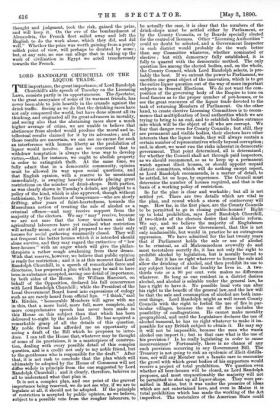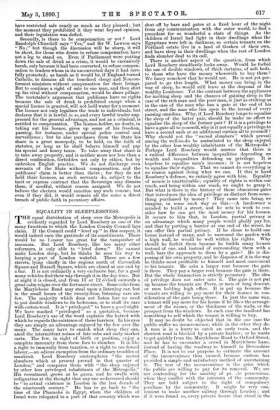LORD RANDOLPH CHURCHILL ON THE LIQUOR TRADE.
THE importance, the great importance, of Lord Randolph Churchill's able speech of Tuesday on the Licensing Laws, consists partly in its opportuneness. The Spectator, to the great annoyance of some of its warmest friends, has never been able to join heartily in the crusade against the drink traffic. Seeing as we do that the drinking races have not only conquered the world, but have done almost all its thinking, and originated all its great advances in morality, and seeing also that the abstaining races show a much higher average of crime, we are unable to believe that abstinence from alcohol would produce the moral and in- tellectual results claimed for it by its advocates ; and if those results are uncertain, we can see no excuse for such an interference with human liberty as the prohibition of liquor would involve. Nor are we convinced that to withdraw temptation is always the true way to develop virtue,—that, for instance, we ought to abolish property in order to extinguish theft. At the same time, we fully admit that in a democratic community, opinion must be allowed its way upon social questions, and that English opinion, with a reserve to be mentioned immediately, is swaying heavily towards placing great restrictions on the number of drink-shops. Both parties, as was clearly shown in Tuesday's debate, are pledged to a policy of the kind, which is also approved, though without enthusiasm, by the fanatics of temperance—who are slowly drifting, after years of faint-heartedness, towards the Mussulman notion of treating the sale of alcohol as a criminal offence—and may receive support from the majority of the electors. We say " may " receive, because we are not sure that the lower workmen and the agricultural labourers have yet realised what restriction will actually mean, or are at all prepared to see their only houses for social gathering summarily closed. They will not frequent the better houses which it is intended should alone survive, and they may regard the extinction of " low beer-houses " with an anger which will give the philan- thropists a rather rough awakening from their dream. With that reserve, however, we believe that public opinion is ready for restriction ; and it is at this moment that Lord Randolph Churchill, in a speech of remarkable force and directness, has proposed a plan which may be said to have been in substance accepted, saving one detail of importance, by both sides of the House. Sir William Harcourt, on behalf of the Opposition, declared his full concurrence with Lord Randolph Churchill ; while the President of the Local Government Board burst into expressions of eulogy such as are rarely heard from official lips. "I think," said Mr. Ritchie, " honourable Members will agree with me in this, that a more lucid, more full, more complete, and more comprehensive speech has never been made in this House on this subject than that which has been delivered to-night by the noble Lord. He has acquired a remarkable grasp of all the details of this question. My noble friend has afforded me an opportunity of seeing a draft of the Bill which he proposes to intro- duce. I can tell the House that, whatever may be thought of some of its provisions, it is a masterpiece of construc- tion, dealing with every possible detail of this complex question, and is a credit not only to my noble friend, but -to the gentleman who is responsible for the draft." After that, it is not rash to conclude that the plan which will 'ultimately be adopted by the House of Commons will not differ widely in principle from the one suggested by Lord Randolph Churchill ; and it clearly, therefore, behoves us all to understand what that plan is. It is not a complex plan, and one point of the gravest importance being reserved, we do not see why, if we are to legislate at all, it should not be adopted. If the principle of restriction is accepted by public opinion, as we believe, subject to a possible veto from the rougher labourers, to be actually the case, it is clear that the numbers of the drink-shops must be settled either by Parliament, or by the County Councils, or by Boards specially elected for the control of licences. Other "Licensing Authorities " could no doubt be selected, and a Government Inspector in each district would probably do the work better than any Committee whatever, whether nominated or elective ; but with democracy fully established, it is folly to quarrel with the democratic method. The only question lies among the elected bodies, and, on the whole, the County Council, which Lord Randolph selects, is pro- bably the best. If we entrust the power to Parliament, we sacrifice one great object of the innovation, which is to get the entire liquor question out of the way of more important subjects in General Elections. We do not want the com- position of the governing body of the Empire to turn on local fancies as to the proper number of pot-houses, or to see the great resources of the liquor trade devoted to the task of returning Members of Parliament. On the other hand, to create elective Licensing Committees is to recom- mence that multiplication of local authorities which we are trying to bring to an end, and to establish bodies entrance into which will be the object of all who are corrupt. We fear that danger even for County Councils ; but still, they are permanent and visible bodies, their electors have other interests than the liquor trade, they will always contain a certain number of representatives wholly beyond corruption; and, in short, we must run the risks inherent in democratic government. That point determined, all is determined ; for whether the Council shall act through paid inspectors, as we should recommend, so as to keep up a permanent watch against illicit houses, or should appoint unpaid district committees, which will do nothing except report, as Lord Randolph recommends, is a matter of detail, to be settled, let us hope, by experience. The Council must determine the number of houses required, and that is the basis of a working policy of restriction.
So far the plan is clear and workable ; but all is not settled yet. There are two details which are vital to the plan, and round which a storm of controversy will rage. How far, in the first place, are the County Councils to be permitted to go in closing public-houses ? Rig t— up to total prohibition, says Lord Randolph Churchill, if two-thirds of the electors desire that drastic reform. We say, and we believe the majority of Englishmen will say, as well as their Government, that this is not only inadmissible, but would in practice be an outrageous oppression. We have admitted for the last twenty years that if Parliament holds the sale or use of alcohol to be criminal, as all Mahommedans avowedly do and most teetotalers secretly do, it has not only the right to prohibit alcohol by legislation, but is morally bound to do it. But it has no right whatever to license the sale and allow the drinking of alcohol, and then prohibit its use to any subject because of the locality he lives in. A two- thirds vote or a 90 per cent. vote makes no difference whatever. So long as one resident in a district desires alcohol, and alcohol is saleable under the general law, he has a right to have it. No possible local vote can alter his right to the benefit of the general law, and the law will be that the sale and consumption of alcohol are both inno- cent things. Lord Randolph might as well invest County Councils with the right to forbid the use of fire in par- ticular villages, because the use of fire includes the possibility of conflagrations. He cannot make morality geographical, and until the Legislature declares the use of alcohol immoral, he has no right whatever to make it im- possible for any British subject to obtain it. He may say it will not be impossible, because the man who wants alcohol can import it ; but in that case what is the use of his provision ? Is he really legislating in order to cause inconvenience ? Fortunately, there is no chance of any such provision occurring in any Government Bill. The Treasury is not going to risk an epidemic of illicit distilla- tion, nor will any Member not a fanatic care to encounter the growl with which great bodies of his supporters would receive a project of total prohibition. We question even whether all beer-houses will be closed, as Lord Randolph proposes, and most unquestionably the majority will not be permitted to shut up all liquor-shops. They were per- mitted in Maine, but it was under the pressure of ideas which are not entertained here, and even in Maine it is total prohibition which has made the working of the Act imperfect. The teetotalers of the American State could have restricted sale nearly as much as they pleased but the moment they prohibited it they went beyond opinion, and their legislation was defied. Secondly, is there to be compensation or not ? Lord Randolph Churchill says " Yes,' and Sir W. Lawson says " No ;" but though the discussion will be sharp, it will be short, for those who desire to refuse compensation have not a leg to stand on. Even if Parliament were putting down the sale of drink as a crime, it would be excessively harsh, only because it had been converted, to refuse compen- sation to traders whom in its unconverted days it had care- fully protected; as harsh as it would be, if England turned Catholic, to dismiss all the beneficed clergy and Noncon- formist ministers without compensation for their livings. But to continue a right of sale to one man, and then shut up his rival without compensation, would be sheer pillage. The teetotaler's argument that publicans have no rights because the sale of drink is prohibited except when a special licence is granted, will not hold water for a moment. The licence not only legalises the trade to individuals, but declares that it is lawful in se, and every lawful trader sup- pressed for the general advantage, and not as a criminal, is entitled to compensation. The licence-holder, no doubt, in taking out his licence, gives up some of his freedom, passing, for instance, under special police control and surveillance ; but he also purchases from the State his share in a great monopoly, to be held, on the faith of statutes, as long as he shall behave himself and pay his special and heavy taxes. To take away that share is to take away property, and is neither more nor less than a direct confiscation, forbidden not only by ethics, but by unbroken English practice. We do not discharge even servants of the State without compensation, and the publicans' claim is better than theirs ; for they do not hold their licences, as such servants do, subject to the tacit or express contract that the Sovereign may dismiss them, if needful, without reason assigned. We do not believe the electors would sanction any such course ; but even if they did, it would remain all the same a direct breach of public faith in pecuniary affairs.







































 Previous page
Previous page